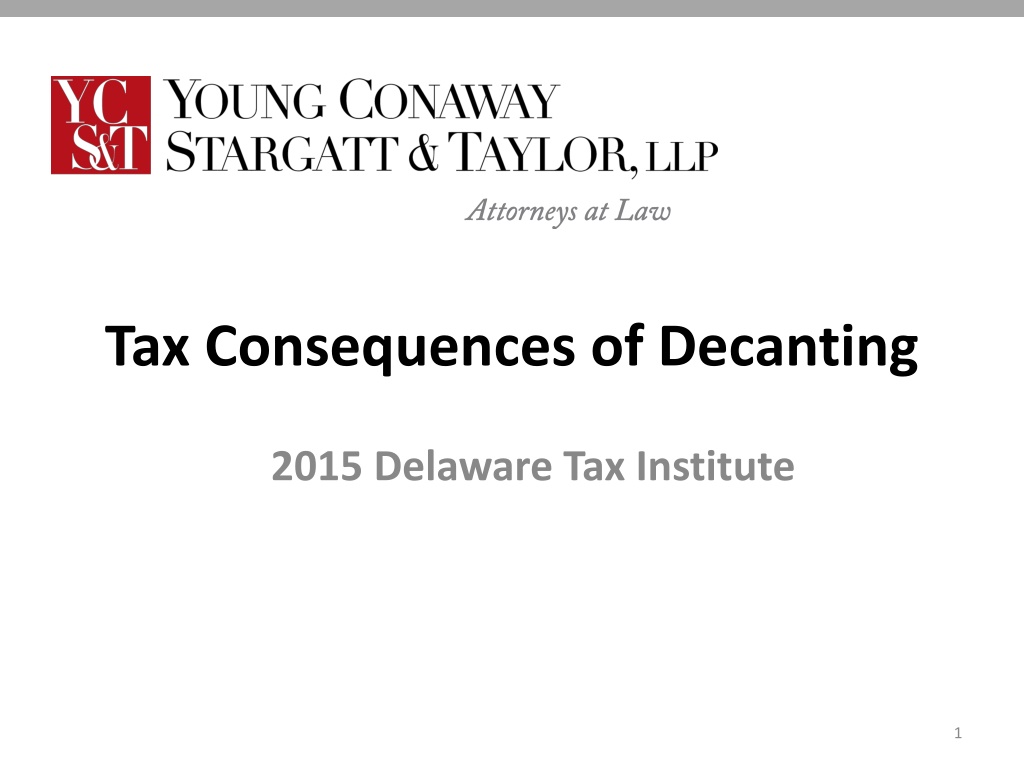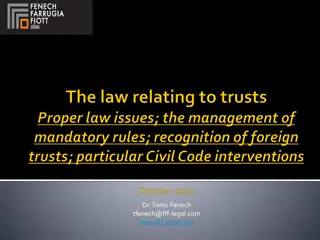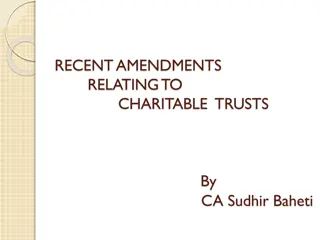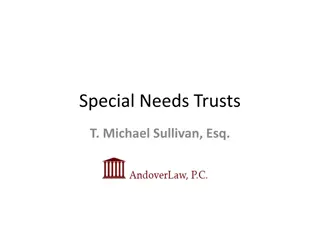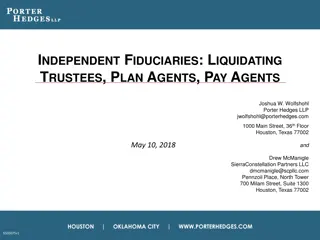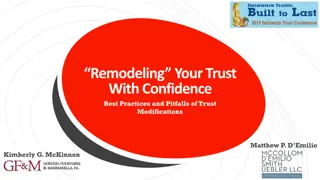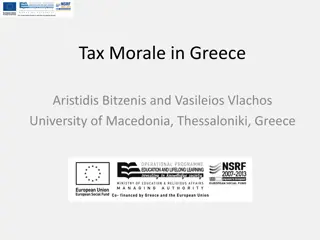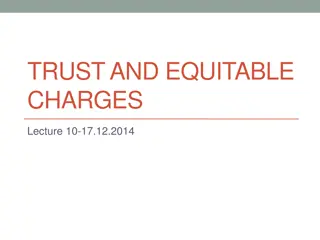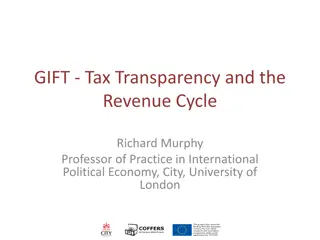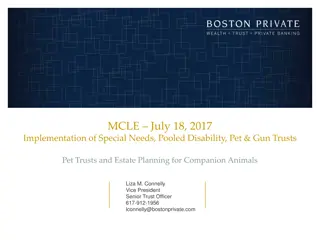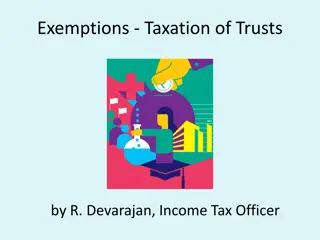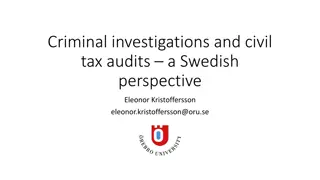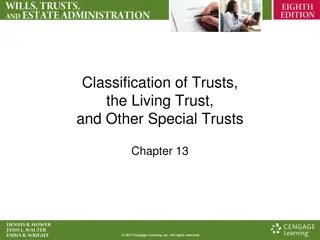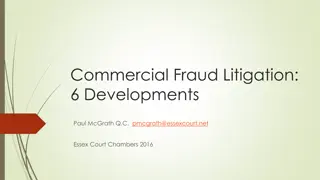Understanding Tax Consequences of Decanting Trusts
Delve into the intricacies of decanting trusts, exploring the potential income tax implications alongside federal wealth transfer tax considerations. Learn how decanting statutes allow trustees to transfer trust assets for the benefit of beneficiaries, while also discovering the non-tax considerations and various uses of this estate planning strategy. Uncover why the IRS has placed decanting on a no-ruling list and how income tax issues are approached when decanting from one domestic trust to another.
Uploaded on Oct 09, 2024 | 0 Views
Download Presentation

Please find below an Image/Link to download the presentation.
The content on the website is provided AS IS for your information and personal use only. It may not be sold, licensed, or shared on other websites without obtaining consent from the author. Download presentation by click this link. If you encounter any issues during the download, it is possible that the publisher has removed the file from their server.
E N D
Presentation Transcript
Tax Consequences of Decanting 2015 Delaware Tax Institute 1
Todays Discussion Brief Decanting Overview Income Tax Considerations Federal Wealth Transfer Tax Taxable Gift GST issues 2
Decanting Generally speaking, a decanting statute permits a trustee who has discretionary authority to invade the principal of a trust (and in some cases trust income) for the benefit of one or more trust beneficiaries to exercise that authority by transferring some or all of the assets of the trust into a new trust for one or more of the existing beneficiaries. At least 22 states have adopted decanting statutes (New York, Alaska, Delaware, Tennessee, Florida, South Dakota, New Hampshire, Nevada, Arizona, North Carolina, Indiana, Missouri, Ohio, Kentucky, Virginia, Illinois, Rhode Island, Michigan, Texas, Wisconsin, Wyoming, and South Carolina). Common Law Basis in: New Jersey, Iowa, and Massachusetts. Number of Other Non-Tax Considerations: Trustee discretion, consent/release, virtual representation issues, jurisdictional issues, notice to beneficiaries, etc. Various Uses: administrative modifications, trust divisions, granting power of appointment, changing situs, eliminate a beneficiary, converting non-grantor trust to grantor trust, conversion to a APT, state income tax planning, etc. 3
Decanting - IRS No Ruling List Rev. Proc. 2011-3 placed decanting on no ruling list. IRS will not rule on: whether decanting gives rise to a Code 661 deduction or results in inclusion in gross income under Code 662; whether decanting results in a taxable gift being made under Code; and whether decanting causes the loss of GST exempt status or constitutes a taxable termination or taxable distribution under Code 2612. 4
Income Tax Issues Decanting from one domestic trust to another should not affect the income taxation of the trust because either: the old trust and the new trust are treated as the same trust for income tax purposes (See Priv. Ltr. Rul. 200736002); or in the alternative, the transfer of assets merely carries out the original trust's distributable net income ("DNI"), resulting in income to the new trust with a corresponding distribution deduction for the old trust. 5
Income Tax Issues Same Trust Theory Based on the "same trust theory," decanting should be viewed as a trust modification, and not the creation of an entirely new trust. See, e.g., Priv. Ltr. Rul. 2007230I4 (Feb. 5, 2007) (ruling that a trust division would not cause a distribution under Code 661 or 662); Priv. Ltr. Rul.200607015 (Nov. 5, 2005) (ruling that a transfer of assets from existing trusts to new trusts for purposes of changing governing law and modifying administrative provisions would not cause the existing trusts, the new trusts, or the beneficiaries to realize income, gain, or loss under Code 661 or 662). 6
Income Tax Issues Non-recognition should still apply even if the tax law treats the old and new trusts as separate entities: Under this line of reasoning, the old trust would terminate and its DNI, including any capital gains for the year, would pour into the new trust. See Treas. Reg. 1.643(a)-3(e), Example (7). In addition, all of the old trust's unused loss carryovers and excess deductions on termination would be transferred into the new trust. This is because under Coder 642(h)(2), the new trust should be considered the beneficiary succeeding to the property of the old trust. Under the separate trust theory, the new trust would receive taxable income under Code 662(a) to the extent of the old trust's DNI, and the old trust would be entitled to a corresponding deduction under Code 661 (a). While this should not produce a taxable event when viewed in the aggregate, it is important to consider any state income (or property) tax issues that may arise when transferring assets from one trust to another. 7
Income Tax Issues for Beneficiaries General Rule: Decanting should not cause beneficiaries to realize any gain or loss. Considerations: Cottage Savings - Exchange of interests in residential mortgages was a realization event notwithstanding that financial regulatory agency found two sets of mortgage interests substantially identical. Court held they were materially different because of different borrowers and property. In decanting, will court find beneficiary s interest in new trust to be materially different? See, e.g., Priv. Ltr. Rul. 199951028 (Sept. 28, 1999); see also Priv. Ltr. Rul. 200231011 (Aug.2, 2002) (finding a taxable exchange when a settlement provided a beneficiary with a unitrust interest instead of an annuity interest); Priv. Ltr. Rul. 200736002 (specifying that a beneficiary could realize a taxable gain if his interests in a new trust created under a pro rata trust division were materially different than his interests in the old trust). In Priv. Ltr. Rul. 200743022 (Oct. 26, 2007), however, the Service confirmed that decanting would not result in a beneficiary's realization of income or loss so long as the decanting was authorized by the trust instrument or governing state law. The Service reasoned that the taxpayer's proposed decanting would not involve a taxable exchange of property because there would only be a transfer of assets from one trust to another, and not a reciprocal exchange involving the legal rights and entitlements of the trust beneficiaries. 8
Income Tax Issues for Beneficiaries Be careful with the following: Foreign Trust to a Domestic Trust Decanting a trust that holds negative basis assets (debt in excess of basis) or a partnership with a negative capital account. (Dealing with the interplay between Crane v. Comm r, Code Section 752(d), and Code Section 643(e)). For example, gain will be recognized on the decanting of negative basis assets from a grantor trust to a non grantor trust. When grantor trust status terminates, the grantor is treated as having transferred the assets to the trust and the grantor is deemed to realize an amount equal to any liabilities held as part of the trust property. See Treas. Reg. 1.1001-2(c), Example (5) (explaining the tax consequences associated with the termination of grantor trust status for a trust holding a partnership interest with a negative capital account); see also Madorin v. Comm'r., 84 T.C. 667 (1985). Code 643(e) does not offer any protection in this context because it does not apply to grantor trusts (Subpart E of Subchapter J). 9
Gift Tax Implications Decanting should not cause a beneficiary to make a taxable gift to the trust unless: the trustee exercising the discretion to decant is also a trust beneficiary (exception HEMS limitation); the trustee's ability to decant is contingent on obtaining beneficiary consent (and some beneficial interest or vesting change); or the Delaware tax trap applies (Code Section 2514(d)). 10
Generation Skipping Transfer Tax Trusts are exempt in two ways: trust became irrevocable on or before September 25, 1985, the effective date of the GST statute; or for trusts that were not irrevocable on or before September 25, 1985, the transferor allocated GST exemption to the trust 11
Loss of GST Exempt Status Treas. Reg. 26.2601-1(b)(1) provides that a grandfathered trust will lose its GST exempt status if an actual or constructive addition is made to the trust after the effective date. Because decanting could be construed as an addition or other modification that causes a trust to lose its GST exempt status, it is important to understand the treatment of decanting under the GST regulations. NOTE: IRS concluded in Priv. Ltr. Ruls. 9848043 and 9849007 that Treas. Reg. 26-2601-1(b)(1)(v)(B) is not relevant when considering trustee s decanting power. Therefore, to preserve GST Exempt Status, must meet the discretionary distribution or trust modification safe harbors. Treas. Reg. 26.2601-1(b)(4)(i)(A); Treas. Reg. 26-2601-1(b)(4)(i)(D). 12
Preserving GST Exempt Status The discretionary distribution safe harbor essentially provides that decanting will not cause a grandfathered trust to lose GST exempt status if the following three requirements are met: When the trust became irrevocable, either the terms of the trust instrument or local law (i.e., a statute or common law) authorized the trustee to distribute trust property to a new trust; Neither beneficiary consent nor court approval is required for the trustee s exercise of such power; and The new trust will not delay the vesting an interest in the trust beyond the permissible perpetuities period under federal law. For purposes of this Treasury Regulations, the federal perpetuities period is (1) a life in being when the trust became irrevocable plus 21 years; or (2) 90 years from the date the trust became irrevocable. 13
Preserving GST Exempt Status In the event a decanting will not satisfy the discretionary distribution safe harbor, the trust modification safe harbor of Treas. Reg. 26.2601-1 (b)(4)(i)(D) acts as a catch-all. The trust modification safe harbor provides that a decanting will not taint the GST exempt status of a grandfathered trust if the following conditions are satisfied: the decanting will not shift a beneficial interest in the trust to a beneficiary occupying a lower generation than the person or persons holding the beneficial interest under the terms of the original trust; and the decanting will not extend the time for vesting of any beneficial interest in the trust beyond the period provided in the original trust. 14
DISCLAIMER The following presentation is for general informational purposes only. It is not intended as professional legal, accounting or tax advice, and any such intention or advice is expressly disclaimed. The application and impact of laws can vary widely based on the specific facts involved, or may change, and you should consult directly with your legal, accounting, or tax advisor with respect to your particular inquiries and needs. Neither the Young Conaway Stargatt & Taylor, LLC, nor any attorney or presenter is responsible for any errors or omissions contained in this presentation. All information is provided "as is", with no guarantee of completeness, accuracy, timeliness, and without warranty of any kind, express or implied. In no event will Young Conaway Stargatt & Taylor, LLC, its attorneys, or presenters be liable to you or anyone else for any decision made or action taken in reliance on any information in this presentation or for any consequential, special or similar damages, even if advised of the possibility of such damages. Circular 230 Disclosure: To comply with U.S. Treasury Regulations, any information contained in this presentation is not intended or written to be used, and cannot be used by the recipient or any other person, for the purpose of (1) avoiding penalties or any other restrictions that may be imposed under the Internal Revenue Code or any other applicable tax law, or (2) promoting, marketing or recommending to another party any transaction, arrangement or other matter in violation of the IRC or any other applicable law or regulation. 15
